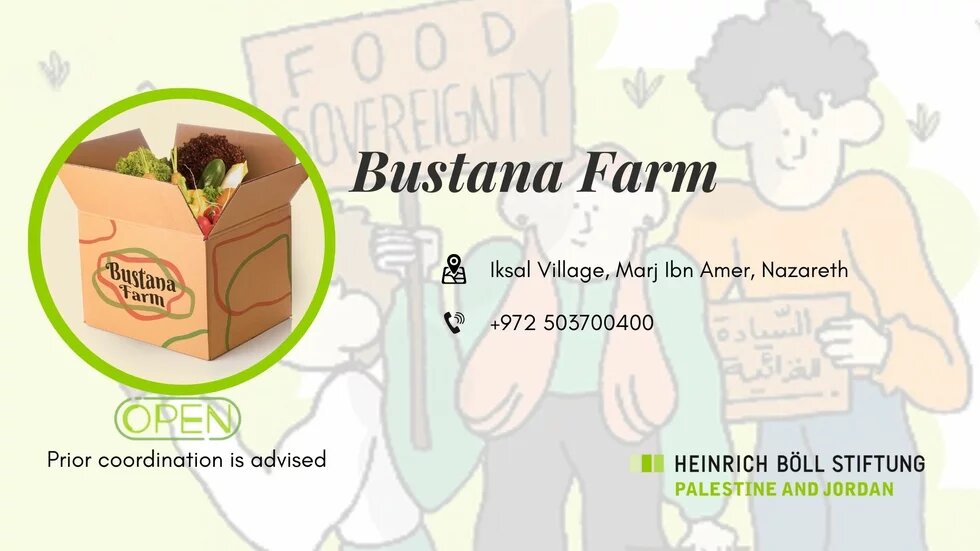Website: www.bustanafarm.com
Facebook: Bustana, @bustanafarm Instagram: @bustanafarm

Bustana Farm (Our Garden Farm) aspires to encourage and provide clean food, revive environmentally friendly agricultural and traditional methods, and preserve the agricultural heritage through Community Supported Agroecology. Its focus is to re-establish the direct relationship and partnership between the farmer and the consumer and to encourage ethical patterns in both production and consumption.
After the death of their father in 2008, the owners of the farm, the fourth generation of the Ounallah family who cultivated the lands of Marj Ibn Amer, decided that the method of cultivation best suited to preserve the land for future generations is the Community Supported Agriculture model that adopts agroecological practices. The farm, located in Iksal village, covers an area of 400 dunums[1]. Iksal, also known as “Bint El Marj”, is a village in the Galilee located 5 km southeast of Nazareth. The farm produces seasonal grains, legumes, and vegetables in addition to the cultivation of olive and almond trees.
The farm believes in the "teikei" Japanese concept that is based on Community-Supported Agriculture (CSA) and it means "relationship" or "partnership". This model of agriculture is the only one in which consumers voluntarily agree to share risks and benefits with farmers. CSA provides a solution to problems related to the intensive agricultural production worldwide, as farmers alone bear the increasingly growing global market risks, which had forced millions of them to leave the land. CSA also offers one of the most aspiring alternatives to prevent the degradation of local traditional agriculture.
Bustana farm depends on four ideas for Community-Supported Agriculture (CSA):
- Partnership: This partnership is characterized by a mutual commitment of farmers to supply food produced during each season to consumers, and consumers who commit to paying for their share at the beginning of the production season.
- Localization: Promote local production and exchange, as part of an active approach to support local economy.
- Solidarity: Entails sharing the risks and benefits of production that is adapted to the natural rhythm of the seasons and respects the environment, the natural and cultural heritage, and health, in addition to fair and sufficient price that enables farmers to live in dignity.
- From producer to consumer: It is based on direct, trust-based, person-to-person communication, with no reliance on intermediaries or hierarchical structure.
The mechanism with which Amir and his family operate the farm is through membership in a weekly ‘Bustana basket’, which is delivered to the doorsteps of members, filled with delicious quality food coming directly from farmers. Production is adapted to the natural rhythm of the seasons, and therefore, preserves the environment and the natural and cultural heritage as well as people’s health. This means that the yields may be rich and varied in a given week while meagre in another. Accordingly, the buyer shall be supportive, cooperative and help in reviving the local agriculture that is based on partnership and reciprocity.
____________________________________________________
Product Availability: Year-round.
Volunteering Opportunities: Harvesting and building fences.
Product Selling Points: Delivery to subscribers and sometimes sale at the farm sit.
[1]A dunum is an Ottoman unit of area that is equivalent to a hectare or 1000 square meters (10002).